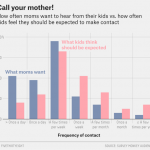I don’t remember whether I’ve mentioned here that I like using Boomerang to manage my email. I can write emails ahead of time and have boomerang send them later or schedule an email to turn up in my inbox right when I need it (say, a half hour before the meeting it pertains to). It makes it a lot better to (try to) do Inbox Zero.
And Boomerang just sent me a little year in review email, which included a nifty visualization of when I wrote emails vs when I asked Boomerang to deliver them.

You can see that I get to manage a lot of my emails Sat and Sun night, so they can go out in the mornings during the week. (I coordinate dinners, debates, and movie nights for friends, and I want the announcements to land when people are engaged with their mail).
I send my emails on time-delay so they won’t fall on deaf ears. And speaking of how ears work….
I loved this article on gecko ears, which turn out to be relevant to how you might design a robot’s hearing system:
Mammals locate the source of a sound by judging the delay between a sound reaching one ear and then reaching the other. This is possible when the ears are relatively far apart, but gets increasingly difficult as the head gets smaller and the ears get closer together. Small animals like lizards and frogs have a tunnel that connects their ear drums—the membrane-covered organs that vibrate in response to sound waves. This tunnel creates an internal sound wave, different from the external waves coming into the ear. A popping balloon would cause the external sound wave; the pop’s echo through the tunnel would create the internal sound wave. The animal hears both of the waves at once, sensing a superposition of the two.
And while you’re being attentive to what you can hear, I bet a bunch of you will enjoy this piece from the American Shakespeare Center on how Lin-Manuel Miranda uses language to reveal character in Hamilton.
[George Washington is] also prone to isocolon, parallel structure, in short, simple patterns like the imperatives we see above, and nearly every line in “History Has Its Eyes on You” begins with an “I + [verb]” statement. These rhetorical patterns underscore Washington as someone straightforward, focused, and solid. (Incidentally, the out- prefix has another interesting connection to Shakespeare, as noted in the Oxford English Dictionary: “True compound verbs in out- are those in which the sense of surpassing, exceeding, or beating in some action is conveyed, as in outdo , outlive , outbid ,outnumber , outface , and the various extensions of these. These are of later origin: a very few (e.g.outlive, outpass, outrun) appear during the 15th cent.; they increase gradually during the 16th cent. (outproffer = outbid, and outcry, out-eat, outgo, outrhyme, outride, outrow in Palsgrave), and become numerous only c1600, being freely and boldly employed by Shakespeare, who is our earliest authority for many of them, including the curious group typified by ‘to outfrown frowns’, ‘to out-Herod Herod’.”)
I also enjoyed this piece on the linguistics of the internet’s new genres of horror writing (think Welcome to Night Vale and all the [X] Gothic memes). For example, here’s a Night Vale tweet:
Don't be afraid of spiders! Spiders are your friends! Sorry, that was confusing wording. All your friends are secretly spiders! Better.
— Night Vale podcast (@NightValeRadio) August 27, 2013
And here’s a quote from Washington DC Gothic:
“What do you do?” “What do you do?” “What do you do?” “What do you do?” The question haunts you. Everywhere you go. Outside a brunch place you’ve never seen before, an infant in a $6000 stroller turns its giant head to you. What do you do? it asks with its eyes. Its mother gives it a piece of organic Swedish flatbread to gnaw on. “What do you do?” she asks you, tilting her head slowly like a bird. Her tone holds no real interest. It is as dead as the flatbread.
And here’s part of All Things Linguistic’s analysis of this genre:
One of the most important rules, and I think the one that might be the most surprising to a lot of people, is to use simple, mundane language. Empurpling the narrative with gratuitous polysyllabisms and grandiose prose is actuallywholly deleterious to the desired effect. This actually makes a lot of sense. Purple prose has a serious abstracting effect, in that it draws the audience away from the action and makes it sound more like they’re listening to a story. So using purple prose to describe your indescribable horrors can make them feel less real, where using everyday language helps connect the audience and make them feel more like there’s some grotesque violation of normalcy going on
If you’d prefer your horror in the form of a participatory courtroom drama, you might like this essay by Mary Hamilton on her experience playing a former zombie on trial for killing someone while zombified:
The frame of the game was fairly simple. Through text display, film and actors, we set up a story: a world where the WK-23 virus had infected significant numbers of people, causing them to exhibit zombie-like behaviour. Set in the later stages of the outbreak, as the virus was being brought under control, the Trial was ostensibly staged by the Community Jury Initiative, which brought two people accused of unpleasant acts in front of the public, and asked them to pass judgement. Fiona, a cured ex-zombie, was accused of killing a man while suffering from WK-23; Clare was accused of killing a zombie, who might one day have been cured had he survived.
The audience got to interview the actors and render verdicts on guilt, punishments, and policies.
If you’d rather handle hard questions that are simple matters of logic, rather than ethics, you’ll like this Nautilus piece on logic puzzles, including this sneaky trick:
“Would you please do me a favor?” he asked her. “I am to make a statement. If the statement is true, would you give me your autograph?”
Content to play along, she replied, “I don’t see why not.”
“If the statement is false,” he went on, “you don’t give me your autograph.”
“Alright …”
His statement was: “You’ll give me neither your autograph nor a kiss.”
Finally, a friend of mine is in a creative writing workshop on devotional poetry and asked me and a few others for recommendations of non-hymn devotional songs. I recommended “How Glory Goes” from Floyd Collins, which I’ve written about before, and was pleased to have the chance to also send along “Lot’s Wife” from Caroline, or Change. A lot of devotional songs tend to be praise songs, but “Lot’s Wife” is much more in genre of psalms of lamentation.
You can check out all the songs that my friend put together here.
For more Quick Takes, visit Conversion Diary!













